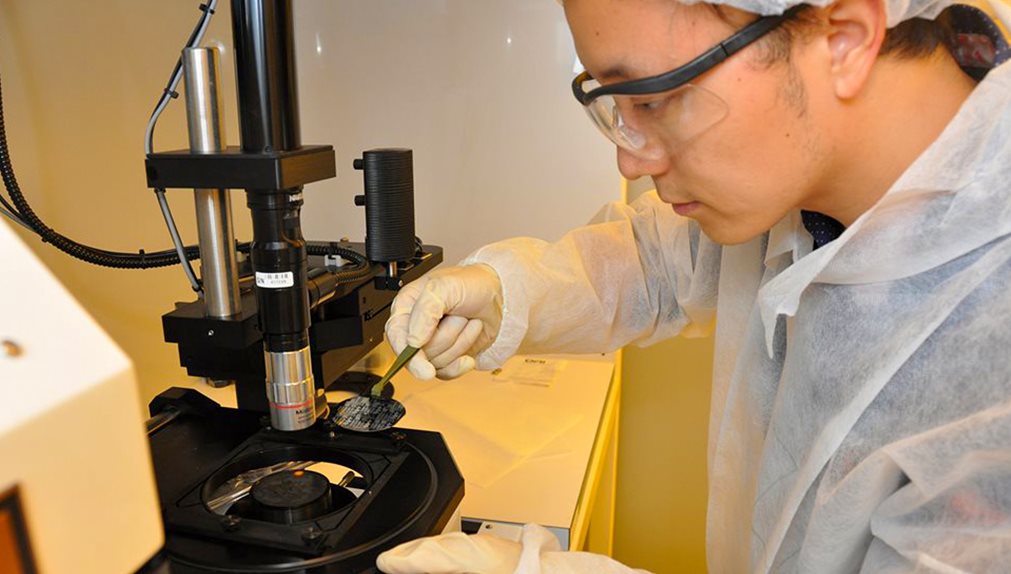We See Your Future in Engineering.
Push the boundaries of science and engineering with a Master of Science in Electronics Engineering designed with you in mind.

Master of Science in Electronics Engineering
Are you someone who needs to understand the complex processes behind technology? Do you dream of improving or creating the technologies that help others live comfortable and healthy lives? Earning a Master of Science in Electronics Engineering from Norfolk State University is the first and best step you can take to follow your passion for technology and helping others in an electronics engineering career.
With a balanced combination of theory and hands-on experience, our intensive 15-credit-hour program will prepare you for a broad range of rewarding electronics engineer jobs. As one of the top HBCU schools with engineering programs in the country, we offer the resources and world-class educational experiences to help you excel both academically and professionally.
A degree in electronics engineering made for you
The world of electronics engineering is vast, with many opportunities for exciting electronics engineering careers. That’s why we offer two paths of study for our master’s degree in electronics engineering. If you’re interested in entering the world of health care, you can emphasize in biomedical engineering — in person or 100% online. If you want to work with cutting-edge technologies like lasers, optical systems or semiconductors, you can focus on microelectronics and photonics — also offered in person or 100% online.
M.S. Degree in Electronics Engineering at a Glance
- Student-to-Faculty Ratio: 4:1
- Formats Offered: In Person, Online
- Total Credit Hours: 30
View Electronics Engineering plans of study | Request more information | Apply now
Why Study Electronics Engineering at NSU?
For almost two decades, the Electronics Engineering program at NSU has helped aspiring electrical and electronics engineers develop the skills and knowledge to succeed as team members and leaders. In fact, virtually 100% of our graduates find their dream electronics engineer jobs or are accepted into Ph.D. programs to continue their education within a few months of graduating.
When you earn your master’s degree in electronics engineering at NSU, you’ll be supported by a remarkable team of faculty, peers and staff who share your passion for education and engineering.
State-of-the-art electronics engineering facilities
Gain valuable hands-on experience working in our cutting-edge Micron-NSU Nanofabrication Cleanroom , a 6,000-square-foot lab outfitted with world-class tools for nanoscale sciences, engineering and energy studies to ensure you’re ready for your ideal electronics engineering career even before graduation day.
Generous funding for electronics engineering students
As you earn your master’s degree in electronics engineering, you’ll benefit from the support of research grants or funding from the U.S. Department of Education. Support typically includes full tuition and a stipend beginning at $22,500 annually.
Get hands-on experience in your field
Be prepared for fast-paced electronics engineer jobs with multiple opportunities for industry internships in prestigious organizations. Gain real-world experience while earning money to supplement your graduate stipend.
What Courses Will I Take as an Electronics Engineering Student?
As you earn your master’s degree in electronics engineering from NSU, you’ll take fundamental courses covering topics such as advanced engineering mathematics, circuits and system design.
Our electronics engineering degree requires a minimum of 30 credit hours. Thesis-track students take nine elective credits and six credits of thesis courses, while nonthesis students need 12 elective credits and a semester-long research project.
Some of the courses you’ll take to prepare you for electronics engineer jobs include:
- Bioelectrics
- Optoelectronic and Photonic Devices
- Solid State Devices
- Electronics and Photonic Materials Engineering
- Biomedical Signal Processing
View the full electronics engineering program curriculum .
Where Will My Degree in Electronics Engineering Take Me?
As technologies continue to evolve and grow more complex, electrical and electronics engineers are in higher demand than ever. Whether it’s hospitals, social media companies, aerospace agencies or U.S. naval facilities, electrical and electronics engineers from NSU are sought-after for their creative problem-solving and communication skills, as well as their expertise and experience working alongside professionals in internships and coursework.
Past graduates have found electronics engineering careers at prestigious organizations such as Apple, Amazon, Intel, Micron Technologies and the U.S. Naval Surface Warfare Center.
Outlook for electronics engineering careers
According to the U.S. Bureau of Labor Statistics, employment for electrical and electronics engineers is predicted to grow by 7% over the next decade, on par with the average growth for all other occupations.
Nearly 100% of Electronics Engineering majors at NSU find satisfying electronics engineer jobs or are accepted into Ph.D. programs within a few months of graduation from NSU.
How Do I Get Started in the Electronics Engineering Program at NSU?
We invest in the future of our electrical and electronics engineers with valuable resources and a dedicated team of advisers and counselors. Have questions about applying to NSU? Want to learn about financial aid opportunities? Interested in what kinds of electronics engineering careers you’ll be prepared for after graduation? Reach out to us today!
Learn more about the requirements for the electronics engineering program.
“My internship with Intel Corporation was a great blessing. I applied a lot of knowledge that I learned in school, and also learned advanced skills from Intel managers, fellow interns and other co-workers. I gained a great amount of experience and knowledge of what being an engineer is like in the real world.”
– Bini Ben ’21, Master of Science in Electronics Engineering
Degree Programs Related to Electronics Engineering
Accreditation for Norfolk State University
Norfolk State University is accredited by the Southern Association of Colleges and Schools Commission on Colleges (SACSCOC) to award associate, baccalaureate, masters, and doctorate degrees. Norfolk State University also may offer credentials such as certificates and diplomas at approved degree levels. Questions about the accreditation of Norfolk State University may be directed in writing to the Southern Association of Colleges and Schools Commission on Colleges at 1866 Southern Lane, Decatur, GA 30033-4097, by calling (404) 679-4500, or by using information available on SACSCOC’s website (www.sacscoc.org).